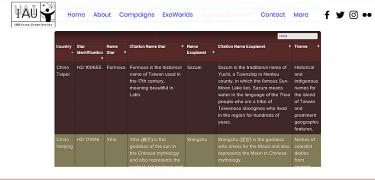Taiwanese astronomers who named an exoplanet and the star it orbits have been listed as being from “China Taipei” by the Paris-based International Astronomical Union (IAU), the Astronomical Society of the Republic of China (ASROC) said on Friday.
The astronomers, who were part of a research team that last year became the first to photograph a black hole, were invited by the IAU to an event to mark the group’s 100th anniversary and name recently discovered exoplanets and their stars, but attended under the title “China Taipei,” the society said.
The IAU said the designation was the result of discussions it held in 1979 with Chinese authorities, which concluded with Chinese astronomers working under the title “China Nanjing” and Taiwanese astronomers as “China Taipei.”
After it announced its intent to participate in the event and opened up entries to Taiwanese astronomers, ASROC received 128 submissions, which received 6,101 votes, it said, adding that it chose the winning entry last month.
The winning name for the star HD 100655, a giant yellow star in the Leo constellation, was “Formosa,” the old Portuguese name for Taiwan, which means “beautiful,” it said.
The star’s exoplanet was named “Sazum,” the traditional name of Yuchi Township (魚池) in Nantou County, which means “water” in the language of the Thao people, “who lived in the region for hundreds of years,” it said.
Academia Sinica Institute of Astronomy and Astrophysics director Chu You-hua (朱有花) said this was the first time Taiwanese astronomers had named an exoplanet, and it was a proud moment for Taiwanese that the nation’s name could spread to the far reaches of the universe.
Recounting the history of Taiwan’s title at the IAU, Chu said the Republic of China joined it in 1935, but after China joined in 1959 as the People’s of Republic of China conflicts arose over two “China” member countries within the organization.
China demanded that Taiwan not be allowed membership, and had threatened to leave if it remained, the IAU said, adding that in the 1979 discussions, China said it was resolutely opposed to any references to “two Chinas,” or to “one China, and one Taiwan.”
The IAU implemented the naming scheme in 1982, Chu said.
“This name we are listed as now was hard won, and affords Taiwanese astronomers a legal basis for participation,” she said, stressing that on the IAU’s Web site, Taiwan is placed under the category titled “national members.”
Source: Taipei Times - 2020/01/06





















